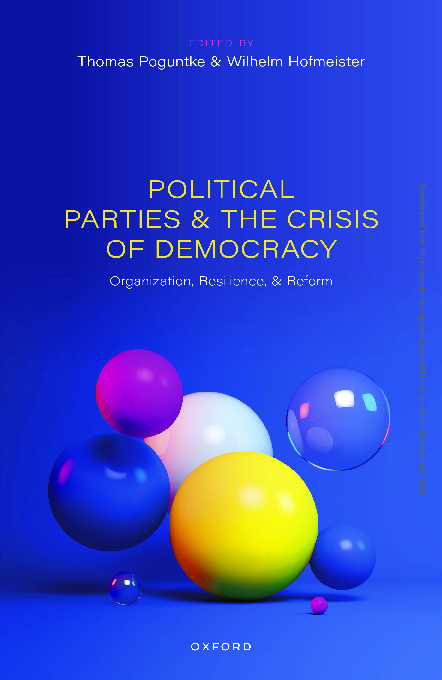Political parties and the crisis of democracy: organization, resilience, and reform

Poguntke, Thomas ; Hofmeister, Wilhelm
Oxford University Press - Oxford
2024
624 p.
political party ; democracy ; political leadership ; extremism
Politics
https://doi.org/10.1093/oso/9780198888734.001.0001
English
Bibliogr.;Index;Charts
"Democracy is in decline, and the share of world's population living in freedom under democratic government has decreased considerably as authoritarian practices proliferate. Surprisingly, most of the analyses that study these developments give little attention to the role of political parties in the decline of democracy, although there is a broad consensus about the relevance of political parties for the functioning of democracy. How parties can contribute to democracy is best understood by looking at a very diverse range of cases in different parts of the world. Instead of taking a regional approach, which dominates the literature on political parties, this book takes a global perspective. It brings together experts from four continents, which opens up fresh comparative perspectives on the role of political parties in the democratic process. It asks how parties contribute to the consolidation of democracy, why they fail today, why new parties emerge and displace old parties, and also what parties need to do in order to survive cut-throat competition, above all with new (and sometimes not so new) variants of populist parties. The book takes a unique global focus, covering old and new democracies in different regions of the world. It covers Western and Central Europe, Asia-Pacific, Latin America and Africa, Turkey, and Israel. This includes presidential, semi-presidential, and parliamentary democracies, and also some countries where democracy is seriously threatened or eroding. It offers unique comparative perspectives combined with a detailed analysis of individual countries and their party systems. The book shows that parties are central actors for the consolidation of democracy, but that organisational reforms are necessary to cope with social change such as individualisation, the decline in party membership, and the impact of new media and modern communication, thus counteracting the fragmentation of party systems and the decay of democracy."
This work is licensed under the terms of the Creative Commons Attribution 4.0 International
License (http://creativecommons.org/licenses/by/4.0/).
Digital
ISBN (PDF) : 9780191995224
Table of contents:
1. Introduction 1
Thomas Poguntke and Wilhelm Hofmeister
2. Analysing Political Parties and Democracy: Themes, Questions, Problems 7
Thomas Poguntke, Susan E. Scarrow, and Paul D. Webb
I. POLITICAL PARTIES AND DEMOCRATIC CHALLENGES IN WESTERN AND CENTRAL EUROPE, ISRAEL, AND TURKEY
3. The United Kingdom Party System 33
John Bartle, Nicholas Allen, and Thomas Quinn
4. French Political Parties and Democracy 58
Elodie Fabre
5. The Long Way towards Polarized Pluralism: Party and Party System Change in Germany 82
Michael Angenendt and Simon D. Brause
6. Fragmentation and Anti-Establishment Politics: The Czech Party System in the 2020s 108
Tomáš Cirhan and Petr Kopecký
7. Italian Parties and Party System(s) 128
Enrico Calossi and Eugenio Pizzimenti
8. The Greek Party Systemʼs Ongoing Crisis: The Cases of ND, SYRIZA, and PASOK-KINAL 153
Costas Eleftheriou
9. Parties and the Party System in Turkey: From the System of ʻDouble Tutelageʼ to a ʻPersonalistic Hybrid Regimeʼ 177
Toygar Sinan Baykan
10. The Portuguese Party System: A Realignment? 199
Marina Costa Lobo
11. Spain: Party System Change and Fragmentation 218
Luis Ramiro and María Salvador
12. Party Organizational Development in Poland,
2001–2021: The Cases of Law and Justice (PiS) and Civic Platform (PO) 240
Wojciech Gagatek
13. Political Parties and Democracy: The Israeli Case 261
Assaf Shapira
II. POLITICAL PARTIES AND DEMOCRATIC CHALLENGES IN LATIN AMERICA
14. The Weakening of the Mexican Party System: The Rise of AMLOʼs MORENA 289
Aldo F. Ponce
15. The Colombian Party System, 1991–2022: Deinstitutionalized but Flexible and Resilient 310
Laura Wills-Otero
16. Political Parties in Brazil: Tradition and Trends in the New Democracy 332
Silvana Krause and Bruno Marques Schaefer
17. Democracy and Political Parties in the Argentine Republic 357
Carlos Fara and José Emilio Graglia
III. POLITICAL PARTIES AND DEMOCRATIC CHALLENGES IN ASIA-PACIFIC
18. Taiwan: Party System of a Young Consolidated Democracy 381
Alexander C. Tan
19. The Development of Party Organizations in New Democracies: Evidence from South Korea 401
Yeaji Kim
20. Japan: Struggle for Party System Change 427
Takayoshi Uekami and Junpei Yamaguchi
21. The Challenges to Democracy in India: The Role of Political Parties 447
Eswaran Sridharan
22. An Anarchy of Parties: The Pitfalls of the Presidential based Party System in the Philippines 467
Julio C. Teehankee
IV. POLITICAL PARTIES AND DEMOCRATIC CHALLENGES IN AFRICA
23. Political Parties and Democracy in South Africa 489
Robert Mattes, Matthias Kro¨nke, and Sarah Lockwood
24. Political Parties in Nigeriaʼs Fourth Republic, 1999–2019 512
Jake D. Dan-Azumi
25. The State of Political Party Development in Ghana 537
Isaac Owusu-Mensah, Emmanuel Debrah, and Enock Mathapoly-Codjoe
V. THE CRISIS OF DEMOCRACY AND POLITICAL PARTIES
26. Can the Parties be Helped?: Political Party Assistance in International Cooperation 557
Wilhelm Hofmeister
27. Parties and Democracy: A Difficult Relationship 581
Thomas Poguntke, Paul Webb, and Susan E. Scarrow
Index 592
The ETUI is co-funded by the European Union. Views and opinions expressed are however those of the author(s) only and do not necessarily reflect those of the European Union or the ETUI.